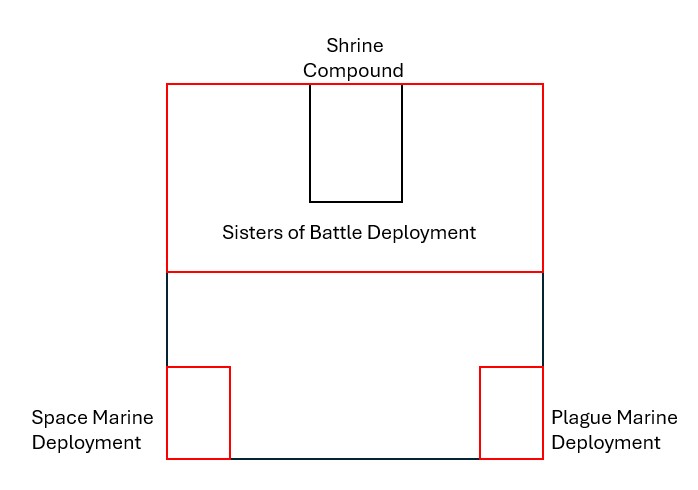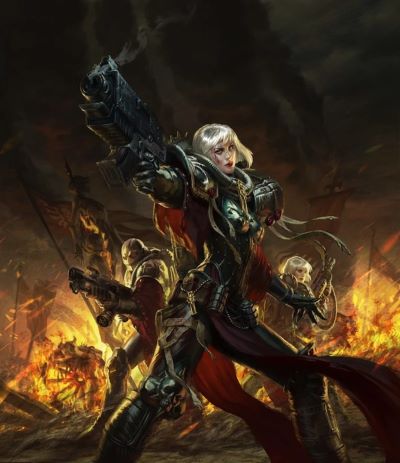Three-player skirmish games can be very tricky to design. Without careful planning, you risk two players ganging up on the third, one player getting stuck waiting for the others to resolve their turns, or the action becoming lopsided. In this scenario, set in the grim darkness of the 41st millennium, I aimed to create a balanced and engaging experience where all three players remained in the thick of the action.
The Scenario: “The Saint’s Fate”
As you probably know, I love adding narrative flavor to my games. Whether D&D or Warhammer an engaging narrative creates much more opportunity for emergent play. I’ve recently developed a loose setting for my 40K inspired games as a way to develop an interesting and ongoing narrative. Consequently, I wanted to set this scenario in the same setting. For more information on Mordax Prime follow the link here. As for the scenario…
A miraculous manifestation has occurred. A Saint touched by the power of the God Emperor, has manifested among the ranks of the Adepta Sororitas, but her fate is uncertain. The Inquisition, ever wary of uncontrolled power, has dispatched a team of Lancet Hereticus Space Marines to capture her for interrogation. Meanwhile, a force of Chaos Plague Marines, the Ferrymen, seeks to claim the Saint for a dark ritual, hoping to summon a daemon of the Warp into realspace.
The Sisters of Battle, unaware of what forces are closing in, have fortified their shrine compound to protect the Saint. What follows is a brutal three-way battle where each faction must act quickly to achieve victory.
Board Setup
- Board Size: 3ft x 3ft
- The Saint: Begins inside the shrine compound, positioned on one half of the board.
- Deployment:
- Sisters of Battle are entrenched in and around the shrine compound.
- The Lancet Hereticus Space Marines deploy in one corner opposite the shrine.
- The Chaos Plague Marines deploy in the other opposite corner.

Victory Conditions
- At the start of Turn 4, an escape shuttle may arrive at the compound on a roll of 5 or 6.
- Each turn after that, the roll threshold decreases (4+ on Turn 5, 3+ on Turn 6, etc.).
- The player who has control of the Saint and gets her to the escape shuttle wins the game.
Note that the Saint begins in the possession of the Sisters of Battle.
Key Design Features
1. Balanced Start & Player Equality
- The two marine factions begin an equal distance from the objective (the Saint in the shrine), ensuring no player has an immediate advantage.
- Sisters of Battle start in a strong defensive position but must react to two incoming threats.
- Both invading forces must contend with the Sisters and each other.
2. Quick Action & Continuous Engagement
- The short board size (3ft x 3ft) ensures combat starts early, preventing long movement phases where nothing happens.
- The Sisters’ defensive position means they will likely be fighting by Turn 1.
- Since the Saint is stationary at the beginning, players must maneuver aggressively and fight over control.
- The time limit ensures that all players must take action in order to win.
3. Preventing “Two vs. One” Situations
- Both the Inquisition and Chaos forces have competing objectives, preventing an easy alliance.
- The victory condition forces all players to engage—hoarding forces in a corner will not secure a win.
- The randomized escape shuttle arrival means players must remain flexible; camping a spot isn’t a viable strategy.
Final Thoughts on the Three Player Scenario
This three player scenario creates a dynamic battlefield where all players are constantly engaged. It prevents downtime, discourages ganging up, and forces strategic decision-making. The next blog post will explore how this scenario played out in actual gameplay—did it live up to expectations, or were there unexpected twists? Stay tuned!
Title image is Sister of Battle by Anna Steinbauer. For more of her awesome art visit her site here.



